26th November 2022
The Spokesmen Cycling Podcast
EPISODE 314: Book Talk With Hannah Reynolds and Ned Boulting
SPONSOR: Tern Bicycles
HOST: Carlton Reid
GUESTS: Hannah Reynolds and Ned Boulting
TOPICS: Hannah Reynolds talks about her LEJOG1000 book “Britain’s Best Bike Ride” and Ned Boulting discusses the fifth year of “The Road Book.”
TRANSCRIPT
Carlton Reid 0:13
Welcome to Episode 314 of the Spokesmen cycling podcast. This show was engineered on Saturday 26th of November 2022.
David Bernstein 0:27
The Spokesmen cycling roundtable podcast is brought to you by Tern bicycles. The good people at Tern are committed to building bikes that are useful enough to ride every day, and dependable enough to carry the people you love. In other words, they make the kind of bikes that they want to ride. Tern has e bikes for every type of rider. Whether you’re commuting, taking your kids to school, or even caring another adult, visit www.tern bicycles.com. That’s t e r n bicycles.com to learn more.
Carlton Reid 1:03
Hi, I’m Carlton Reid and this episode of The spokesmen podcast is book-shaped. I talked to Hannah Reynolds about her LEJOG book. But first, here’s Ned Boulting discussing the fifth year of the big fat Road Book. So happy birthday, fifth fifth edition 2018 was the first one and this is this is a big heavy book. And it’s the 2022. So five years
Ned Boulting 1:35
10 kilos. And kilogrammes, you could put it another way or the best part of 5000 pages. Yeah, I think when we set out we we thought about the future. And we thought wouldn’t it be nice feeling to get to five years, and then take it and then go again. And you know, because it’s a substantial chunk of time, and actually can’t when you think about and I take great pleasure, see, for me, this is the whole point of the book, I picked up the 2018 edition. And I actually reread sounds rather vain this actually. But I reread my editor’s introduction from 2018, which none of which I can remember writing, I mean, five years is quite a long period of time. And what struck me is how completely different the road racing world is already in that five year period of time. It’s like, it’s like looking to a different generation of bike riders, you know, it’s quite extraordinary.
Carlton Reid 2:24
I think you mentioned in this year’s editorial about the Gen Z, the the transfer of power across,
Ned Boulting 2:32
And how quickly it’s happened. You know, I think that I think the evolution in road racing is actually accelerating. And I think the following year after 2018, 2019, for me is where it really started to change rapidly. And everything takes I think everything, for obvious reasons in the road racing season takes its lead from what happens in the Tour de France. And that was the year in 2019, where we had this wildly unpredictable ride from Julian Alaphilippe, who really seriously started to pose the question, can you win the Tour de France for France, you know, and ultimately, he came up short, but it was glorious while it lasted. You also had that incredible cameo from various other ridters. But it was Alaphilippe’s attacking spirit, and also his sense of adventure. And his kind of, well, I don’t even I don’t know how long I can sustain this, but I’ll give it a go. That sort of spirit of risk readiness, I think has infected the peloton. And I think that that’s what’s led to these multiple different riders doing what appears to be impossible things.
Carlton Reid 3:38
And in this editorial in the current one, the 2022 you’re absolutely major you suddenly start on the Tour de France. So that’s I mean to a to an outsider, Tour de France is the only race in the whole year and the rest of your book is I’ve never heard of these races. So that’s kind of like, how do you justify talking about the Tour de France in that way in that an enthusiast would be ‘Oh, no, no, no, that that, you know, the, this tiny, you know, minor race in you know, in this tiny area is much better.’ So how do you how do you kind of like, justify going straight into the race that everybody knows.
Ned Boulting 4:17
Well, because it was the race that it was this year. I mean, 2022 is a very particular edition of the Tour de France, not only I think I make the point in the and I’ll come back to that point, Carlton. But I also it’s a slightly wider point that I try to make in this my editor’s introduction this year, that it’s it’s about the Tour de France and July, the month of July because let’s not forget this year was historic because it was the Tour de France Femme which launched or relaunched, I should say. So July and France took centre stage no doubt about it for a couple of different reasons this year. And that’s not to disparage the other races. That’s not to you know, that’s not to decry those people who feel very strongly and for perhaps for good reason. There’s no more beautiful race than Tirreno Adriatico, or the Four Days of Dunkirk. You know, that’s all, that’s all wonderful stuff in great detail and venerable, fascinating racing. But if we’re honest with ourselves, this year, in particular, the Tour de France stood head and shoulders, the men’s Tour de France stood head and shoulders above all the other stage races, I think, because of the spirit in which the two main protagonists competed, because of the spirit with which Tadej Poga?ar, in his young career, still at the age of just 23. He was in July, encountered for the first time in his racing career, a major setback and, and it just bounced off him and his spirit and his contentedness with his chosen profession just shone through as if what we learned about today production was that actually, he’s a racer in the purest sense of the word what he loves about his chosen career is he loves to race every bit as much as he loves to win. I thought that was remarkable. I thought that I thought that Jonas Vingegaard the fulfilment of his very quick project from domestique to Tour de France champion was absolutely extraordinary to witness. But over and above that, I thought that the individual ride by wild van art this year, and everything that we achieved, I think there’s a strong case to argue, look, these things are just conjecture and opinion. But there is genuinely a strong case to be made for that individual performance by Wout van Aert this year, being perhaps the greatest single ride by an individual in one edition of the Tour de France in the whole history of the race. Because never before have you had a rider capable of winning over the same portfolio of different skills. And also being a domestique who rescues the yellow jersey. It was I mean, you know, you look back to the era of Hinault and Merckx and to some extent Anquetil as well. And they were capable of doing certainly in the case of Merckx, doing the things that Wout van Aert did in other words, winning sprint, winning individual time trials and winning mountain stages are coming very close to winning mountain stages. But they they will never domestiques they were never domestiques and Wout van Aert’s interventions as a domestique over and above everything else that he achieved. And by the way, he won the green jersey, and he very nearly accidentally won the polka dot jersey. His other massive intervention in the race was on more than one occasion he rescued Jonas Vingegaard.
Carlton Reid 7:37
You mentioned some of the old guys there, Anquetil, and Merckx so you almost wish that there was a road book in 1969? Because then you could go back to exactly that and go and pore through it. Well, is there any chance? Could could that be, you know, you could resurrect some of these statistics? Could you do an old version of this this book?
Ned Boulting 8:03
Can I just say Carlton, watch this space? Watch this space very closely. Because because that that was, you know, that that thought was sowed in our minds as early as 2018, when in our first year of the road book when I gave Chris Froome, a copy of the Road Book in person. And don’t forget, that was the year that Chris Froome won his last grand tour that was 2018 when he won the Giro d’Italia in that brilliant fashion. And I gave him a copy of that book. And he looked through it. And he’s he looked at me looked me in the eye and he said, What I’m just it’s just beyond irritating, that I haven’t got one of these for every year that I was winning the Tour de France. So we went Oh, yeah, like that. We always had to invent a year zero. And that was 2018. The first year we got it. But wouldn’t it be something to go back in time and pick years? And give them those treatments? So watch this space.
Carlton Reid 8:59
Okay, I just pulled up the history of Wisden’s. And that’s 1864. And yeah, they’ve got they’ve got a bit of a head start. But I mean, that’s basically what you’ve produced here. So for anybody who isn’t about cricket and their cycling, this is the equivalent to the Bible of cricket, the Bible of cycling is that that kind of thing you’ve gone for?
Ned Boulting 9:22
Wisden was very much our inspiration and the managing editor of the you know, the person who does the hard graft in terms of picking out the detail and putting the layout on the page. A brilliant colleague called Charlotte Atyeo. She came she came from Wisden. She for many years, she worked at Wisden. And so she knows how to make a book like that. May I just say that it’s my opinion, Carlton, that you don’t have to validate or disagree with, but it’s my opinion that as a product that sits on the shelf. I prefer the road book in the sense that it’s a nicer book. It’s bigger, the quality of the print and the paper on which it’s printed is significantly higher than Wisden. And we’re very proud of that as well. It’s not just what you read on the page, it’s the way the whole thing feels in the hand. That matters to us greatly as well.
Carlton Reid 10:13
Yeah, so it’s like a quality book of old. Yeah, it’s not full of photographs. It’s not like it’s not a Cycling Weekly, you know, annual, it’s, it’s a different animal, isn’t it here?
Ned Boulting 10:26
Yes. And in the past, you know, there have actually been in not not written in English, but in, in Italian. And in Dutch, there have been books in the past that have done the equivalent of what we do, but they’re no longer in print, and they’ve kind of come and gone. But they were always packed with adverts, and they were printed on magazine paper and a bit sort of like, whereas we knew from the start that if we were going to do this, it had to be an enduring a beautiful project, which actually, it kind of heaped the pressure on us in year one. Because we knew that whichever design we came up with effectively would have to look unchanged and beautiful 50 years from now, you know, so we’d have we had to get it right.
Carlton Reid 11:04
So I’m looking here at the first one, it’s 878 pages, you know, give the frontispiece a few pages too, 880. And that’s the same as the this years one. So you are stuck. Do you think you’re stuck at that? That’s the heft you need? That’s how many pages you need to tell the year?
Ned Boulting 11:25
Tthat’s interesting, I didn’t know its identical. Well, we, I mean, it does vary a little bit. It varied, of course. And this has really historically, it varied enormously in 2020. So if you look at if you were to look at the 2020 edition of the book, it’s like almost half the size, two thirds of the size, perhaps because so many races were cancelled. Yes, we took the decision that year as well to tweak the monogram at the on the spine and actually fracture it to break it up a little bit. And so this is also part of the what the Road Book does is it documents history that sits alongside the racing season. Yeah, I was at I was at the UAE tour this year working at the UAE tour, which is, by the way, something I regret doing and I’m never going to do again. I was there when Russia invaded Ukraine, and a Russian team were represented on the race Gazprom RusVelo, which now no longer exists, it was disbanded very quickly after that. And, you know, when I came to write my report, my reports for the roadbook about the UAE tour, what was going on geopolitically definitely figures in you know, how we remember what happened in February 2022. So the pandemic, the war, all of it is, you know, reflected in, you know, road racing is not immune from its interaction with the real lived world. And so, going back to your original question, I think it’s fascinating that 2020, the 2020 volume is thinner, and it will always look different on the shelf. You know, and people, you’ll look back at that and you’ll go, wasn’t that just the worst of times, and then you’ll maybe pick the book up. And you’ll look at the weird Vuelta that year, that finished in mid to late November. With those long shadows, you know, as the race finished at four or five o’clock in the afternoon, it is virtually sunset. That’s incredible, also and a certain sort of beauty about it.
Carlton Reid 13:18
You also mentioned but very briefly, but you kind of introduced cyclocross a little bit, you even have one one brief, very brief mention of gravel cycling. And then you mentioned the fact that you think you might not be including it until it is its own entity because it clearly only road riders riding these things. So tell us why you’ve put cyclocross and that very brief mention of gravel cycling in.
Ned Boulting 13:41
Yeah, it was it’s an interesting debate that and I kind of appreciate the readers input in this, I think cyclocross just became something we can no longer avoid, in the sense that it was having such a bearing on the way that the road season was was, was being raised with the advent of Vanderpool, Van Aert and Pidcock. Because they had done what they did during the winter and develop this kind of physiological and psychological skill set that cyclocross seems so perfectly attuned to. They were shaping racing, they were shaping road racing, reshaping it. And so I think we thought there’s too much crossover now between, you know, the cyclocross and the influence it’s having on road racing for us to ignore it any longer. And also, it’s, you know, people are really paying attention to it much more than they were. And so, and also, I think our other justification was alright, it’s not on the road, but a cyclocross bike kind of looks like a road bike. You know, it’s not, I don’t think we’re ever will ever include track in the road book. I think that’s a leap too far. But gravel, gravel is definitely on a road. And so in that sense, perhaps it should be in the road book. But at the moment, I don’t feel as if gravel is dictating the terms of road racing. I think the opposite is true. You know, I think road racers are going and experimenting with gravel. But I’ll keep my eye on that. And I think there’s a strong argument potentially in the future for gravel, the gravel series, such as it is, and the new world championships to be included in the Road Book.
Carlton Reid 15:12
You’ve even mentioned, I’d have to look at issues of your own to this before you’ve even mentioned transportation cycling in this editorial, but again, it’s a fleeting mention, but you’ve mentioned it, because that’s your other great love, isn’t it?
Ned Boulting 15:26
Yeah, very much so, Carlton, I mean, I don’t see this as a contradiction. I see it actually as a natural evolution of my own history in cycling, which is relatively young, I suppose, in the sense that this was my 20th Tour de France that I covered this year.
Carlton Reid 15:42
I was gonna say, Yeah, I was gonna … young? 20th Tour de France?
Ned Boulting 15:46
Well, I still feel bad, isn’t it, but I still feel like a slight newbie to a newbie. Even when I speak to people like you, Carlton, I know and understand you’re steeped in the sport. And your your history long, long far predates mine. So I always feel like I’m talking to Pete, you know, yesterday, I was at Brian Brian Robinson’s funeral. First British winner of a stage at the Tour de France. And of course, a lot of his peers and colleagues from similar generation were there as well. And I spent hours talking to Barry Hoban, and Hugh Porter, after after the funeral. And of course, in their company, I barely open my mouth, because I don’t feel like what I have to say is have any merit. Anyway, I digress. The point about the point about my education in cycling is that the sport, the elite, the highest end of the sport, ie the Tour de France, that’s what drew me into cycling as a spectator. But it wasn’t long before I came home from the Tour de France and bought myself a bike. I literally joined those dots, I made that connection. And of course, the first bike I got was wildly inappropriate. And I couldn’t conceive of doing anything other than every time I jumped on my bike, wearing a helmet, clipped in shoes, full Lycra, even if I was going to ride for two miles. And then bit by bit, I’ve kind of understood that I don’t need to do that. And my my cycling has become much more utilitarian to the extent that almost almost cycling now is one trouser leg rolled up, no helmet. And it’s to get from A to B, I live in London, which is very, perfectly kind of like set up, I think, to use the bicycle as a tool for everyday cycling. And bit by bit, you know, I’ve stopped owning a car maybe six or seven years ago, bit by bit. The understanding that the bicycle is an amazingly powerful and accessible tool for us to change our built environments. And the way we go about living our lives has really dawned on me and it’s become something of a passion.
Carlton Reid 17:47
If you haven’t we we really were really grabbed you if we as the cycling as a whole we’ve we’ve really converted you.
Ned Boulting 17:56
Yeah, yes, yes. I mean, and sometimes it’s, it’s very hard to make the case sometimes for elite sports, you know, you know, those rather trite slogans that always wrap around sporting events, like “inspire a generation” and all this sort of thing, you know, and it’s actually the evidence that bringing the Olympic Games to a country actually does much in terms of people kind of like leading a more active and physical lifestyle. But I think the bike does that. I think people consciously or unconsciously, I think they join the dots between watching men and women ride bikes at an amazing level on the television and actually contemplating getting a bike themselves and getting an I think there is a lot of evidence to suggest that, you know, let’s face it, the Tour de France is the biggest single global showcase in the world for this extraordinary invention that’s over 150 years old, but largely unchanged, which is the bicycle, which is why, which is why the debate around the total for the carbon footprint of the Tour de France, which is egregious, you know, a horror show when you think about it, debate around whether or not it is right that the Tour de France even happens on these terms, given how much carbon it emits is actually quite nuanced. Because on the one hand, yes, that’s indisputably a bad thing. On the other hand, like I say, it is the shop window, the bicycle as an invention as a tool as a thing. If you take that you take the Tour de France away, the bicycle disappears from the public consciousness
Carlton Reid 19:42
Well, as a cycle historian I would I would absolutely 100% back you up on that because that’s that’s why these races were, were created. This is why the first promoters of racing they were doing it to promote basically transportation cycling. To get people to think, “wow, you can travel the whole way around France? Oh, that means I can go to the shops on my bike then,” if they can do that I can do this was the reason for race isn’t the Oh, clearly they’ve grown to be a very different thing now. But that was definitely the people who started these races and people who started getting people to go faster on further on bicycles. Yes. So going around the world was another one is all to show people how practical this this machine is. So I 100% agree with you.
Ned Boulting 20:28
Yeah, and I think that message still applies.
Carlton Reid 20:31
But there is a there is a so there is a great argument. I mean, okay, people will might be losing Twitter out here. But certainly, on all forms of social media, there is this this this town and gown, kind of argument of you know, that Formula One, motor racing is very different from transportation driving, you know, we don’t mix those two. So why should we mix cycling, you know, pro cycling, and transportation cycling, but they’re much, much more closely allied than I think most people think. And that argument, I think, is actually not quite so strong as people maybe think.
Ned Boulting 21:06
I mean, it’s very, it’s very hard to gather this evidence cogently and actually present it. And then even if you do, have you ever, it’s very hard to convince people. But I would just say, literally, listen to what I’ve just said, listen to what I’ve how I’ve described my career, or if you like, my lifestyle. That’s it. That’s that’s exactly what I did come. I mean, I was, when I first went to was sent to cover the Tour de France, I was in my early 30s, I was a little bit overweight, I was a person who would not think twice about jumping in my Renault Scenic to go, honestly, quarter of a mile down the road to the shops and come back again. And then I was sent it to the Tour de France. And everything changed. And it changed simply because I hadn’t stopped and thought about bicycles at all. You know, I probably last cycled before then, at the age of about 17, was probably the last time I jumped on a bike. So between the age of seventeen, and that’s so common, isn’t it? In our experience, you know, we ride our bikes, it’s and then for, for whatever reason, as we come into adulthood, we drop them. Or at least that used to be the model. And so for the age of 17, to my accidental encounter with the Tour de France, and first at the age of 32, however many years that is, I simply didn’t give it I didn’t think about bicycles at all, not once. And here I am. You know, and I know it’s anecdotal. And it’s, it’s just one example. But I genuinely think that’s how it can work.
Carlton Reid 22:37
And that’s a great analogy, a great example.
Carlton Reid 22:40
So let’s go, let’s, let’s finish this by just give the plug for the Road Book.
Carlton Reid 22:45
So how much is it? Where can people get it from all that kind of stuff, give us the biography of your book.
Ned Boulting 22:50
Okay, it’s, it’s available almost exclusively on theroadbook.co.uk on mail order, we ship across the world, it’s £50, and we’re holding our price down. And I know it sounds a lot of money, it’s the same price as Wisden, incidentally. But it’s been a real fight for us this year with increased everything costs, including printing to keep our price. There are also special split quite a lot of special offers in terms of building your collection and retrofitting it if you’re only coming to the Road Book this year, because you will want to have the whole lot, I promise you, because that’s the point. So you’re building a collection. And as I say, plans are afoot to expand the portfolio in the years to come. And we’re enormously proud of it. And what I feel more proud of than almost anything else is that, although it is built at built, although it is written and published very much with the road racing fan in mind, you know, what I find really beautiful about it is that when we send it to riders whose names are printed on the pages, who’ve actually done the things we’re talking about, the universal reaction is, oh my God, and they feel in a digital age where all their results are recorded online. They even they understand the sort of emotional purity of having it printed beautifully and presented in a book like the Road Book.
Carlton Reid 24:14
Yeah, the longevity of it, that the the kind of the mystique of it of being mean books on a bookshelf in 50 years time.
Ned Boulting 24:22
Books are still quite rightly held to a standard, Carlton. You’ve written books, I’ve written books, you know, for example, that if you write an article, which makes certain claims about a living human being, and the article is going to be printed in a newspaper or in a magazine, or online, the lawyers might have a look at that and go “well, you probably get away with that.” If you make the same point in a book, legally, that will by practice be held to a higher standard. It’s a fascinating, isn’t it? So the very act of putting things down in a book as opposed to any other form of medium, written medium is still valued above everything else. And for good reason it’s bookshelves exist that it’s there to stay.
Carlton Reid 25:13
Well, long may they grown with a heavy Road Book. How many? How many kilos? Did you say it was in total?
Ned Boulting 25:20
Two kilos. So there are now 10 kilogrammes of the roadbook in existence, and we’re halfway towards becoming a Ryanair baggage allowance.
David Bernstein 25:32
Hey everyone, this is David from the Fred cast and the spokesmen and I’m here once again, to tell you about our amazing sponsor Tern Bicycles at www.ternbicycles.com t e r n bicycles.com Tern are committed to building bikes that are useful enough to ride every day and dependable enough to carry the people you love. Speaking of being able to ride every day as a spokesmen listener, I’m going to bet that you are the go-to consultant for your friends who want to ride but are an enthusiast and need some advice on what to buy. In that case, you may have people in your life for whom you just haven’t been able to recommend just the right bike considering their stature, age mobility issues or just plain hesitant to get back on a bike. Finally, those family members and friends can experience a new bike day with the all new Turn NBD new bike day Nbd. Okay, the NBDd has been specifically designed to be confidently easy to handle and easy to ride even. Even for those folks who might be as Josh Hon, team captain of Tern Bicycle says are smaller in size and have a hard time finding a bike that fits or older riders who might not have ridden a bike in a while or riders who might have balance or physical issues or riders who are just intimidated by the sheer size and weight of the average ebike. As Josh goes on to say the NBD will be refreshingly easy to hop aboard and ride. Now how can Josh be so confident in that? Well, it’s simple. The NBD has the lowest longest step through opening of any premium ebike. So if you know someone with a knee or a hip injury or or somebody who just can’t lift their leg over the top tube of a regular bike, this alone could make all the difference plus the NBD is designed with an ultra low centre of gravity and a longer wheelbase. And what does that mean? Well, it means that it makes it easy to balance and handle. And with a lowered bottom bracket and motor the NBD is stable for all riders and particularly inspires confidence for shorter cyclists because they can easily get their feet on the ground when they come to a stop. But the NBD isn’t just for shorter riders. As a matter of fact, it adjusts in seconds. Without tools by the way to fit riders from four foot 10 to six foot three or 147 to 190 centimetres. The NBD is also super comfortable with its upright riding position, swept handlebar suspension seatpost and wide 20 inch balloon tires need to load the NBD into a car. No problem, it folds flat in seconds. How about getting into it into a smaller living space? No sweat. The NBD includes Tern’s vertical parking features, you can roll the bike into a small elevator and park it in a corner of your apartment. Now with a max gross vehicle weight of 140 kilos that’s 308 pounds, the NBD can easily carry an extra passenger and plenty of cargo with up to 27 kilos on the rear rack and up to 20 kilos on the front rack. And in fact, it works with a wide range of Tern accessories and with most child seats, as I’ve said before, and this is important to me really important safety is a core value at turn. And that’s why the NBD frame and fork have been rigorously tested by one of Europe’s leading bike test labs. That’s also why turn chooses to use the Bosch motor and battery system. It’s one of the few systems on the market that meets and passes the UL standard for battery and electronics safety read the news and you know how important that is. Now the NBD comes in two models with prices starting at $3,899 or 3999 euros and bikes are going to start arriving in stores in Q1 of 2023. For more information about the NBD or any of Turn’s wide range of bikes, just head on over to ternbicycles.com Again, t e r n bicycles.com. We thank Tern for their sponsorship of the spokesmen podcast and we thank you for your support of Tern. Once again, thanks for allowing me this brief introduction everybody. And now let’s get back to Carlton and the Spokesmen.
Carlton Reid 30:07
Thanks, David. And we are back with show number 314 of the Spokesmeen podcast and before Davids’ ad break, there was a discussion that I had with Ned Boultin, and we were discussing that Road Book. And now owever, I’d like to go across to Hannah Reynolds. And Hannah will be talking about a book that is involving a very famous long distance ride from one part of the United Kingdom to the other part of the United Kingdom so Land’s End to John O’Groats, but in a slightly repackaged way. Where were you actually today, but physically, where are you?
Hannah Reynolds 30:52
I’m in Mal
Carlton Reid 30:55
I thought you said so that’s why why why are you in Mallorca?
Hannah Reynolds 30:59
The story is my partner’s a teacher at an international school here. So we’ve moved out here for the school year. So I’m living in the opposite corner to where most cyclists are so we’re we’re dying in the kind of like the south east corner. So opposite to sort of present here and Alcudia way you normally see cyclists so it’s been good it’s been exploring the island from from a different direction.
Carlton Reid 31:31
Because normally when you’re in the UK, you’d be in Sedbergh, is that right?
Hannah Reynolds 31:35
Yes, I’d be in Sedburgh which is in Cumbria, it’s Sedbergh is in the administrative county of Cumbria. It’s in the Yorkshire Dales National Park and we have a Lancaster Lancashire postcode so it’s it’s in the it’s in between the Lake District to one side and the Yorkshire Dales to the other all mixed up. Yeah, exactly.
Carlton Reid 31:59
And then I’d like to go through your CV, because I’ve noticed that there’s a there’s a Newcastle angle here for me in that you’ve worked as a guide for Skedaddle yeah?
Hannah Reynolds 32:12
That’s right. It’s been for 10 years now I think maybe even a touch more Hmm.
Carlton Reid 32:17
Now I’ve I’ve done some trips with with it wasn’t actually a Skedaaddle trip. It was a different it was Ciclismo Classico. But the guides there that they were from Sardinia, and they were saying they knew the Ouseburn river? I thought really well, because they get brought across by Skedaddle. So is that the same case for you? You’ve been to Newcastle plenty of times because of Skedaddle?
Unknown Speaker 32:47
Yeah, I’ve been to Newcastle a fair bit and the main office is there. So I pop in there quite frequently. And we have, as your Sardinian guides were telling you, we have a guides get together every year. So wherever, wherever you are in the globe, you know, whether you’re working in Italy, Spain, France, or even further, further afield, we’ve got Skedaddle holidays, really do run in every corner of the world. So we all get together and exchange some ideas and talk about guiding and make sure that we’re all you know, doing things to the same standard and in a similar way. So it’s a really nice multicultural company to work for. From that point of view. I was mainly France, hesitant as always to mention the B word. But the the double whammy of COVID and Brexit meant that we’re not we’re not looking after France anymore. Actually, your Sardinian guides Italy will be helping to run some of the French holidays. So I still hope to guide there. I love cycling in France. I you know, I genuinely think that France is one of the best countries in the world for cycling because it’s so it’s so culturally endemic that even if you’re not a cyclist, you understand cycling, whereas many other countries that I’ve cycled in and travelled to cyclists understand cycling, but the rest of the country doesn’t. Whereas you can turn up anywhere in France and someone will they’ll be able to at least name some of their country’s most famous races and understand the challenge of cycling you feel really, really welcome and respected in France. So yeah, I’d always choose to cycle in France and guide in France when the opportunities are there.
Carlton Reid 34:32
So given that B word, where are you guiding now then?
Hannah Reynolds 34:35
I’m not currently guiding. We’re in a in an offseason. I guided in the UK last year. We do Land’s End to John O’Groats, obviously some lovely cycling around the Dales and the Lake District. I did a Tour de Ecosse so little loop around Scotland. So yeah, I did a lot more than that. UK last year, which, I suppose has been interesting for me. I know I mean, you always feel like you know your own country quite well, but there’s so many places that I’m yet to really deeply explore even in my own backyard. So it is nice. Sometimes that whole staycation vibe, I think opened people’s eyes to what we’ve got on our own doorsteps.
Carlton Reid 35:23
And you mentioned Land’s End John O’Groats there. So let’s talk about your book, six years in the preparation, it says in the press release.
Hannah Reynolds 35:31
Yeah, it was a slow burn that one. Our first book, our first guidebook was France en Velo, which was from St Marlo down to Nice. So it was 1000 mile journey across France, from the channel to the med, with the objective of finding the best cycling and the best kind of segmented cross section of the country. And that was a fabulous book to research. It was a wonderful book to write. We had some lovely cycling experiences. And we did all kinds of things with that we we plan the route and cheese, we planned the route and why, you know, we really kind of got to know that, albeit very narrow, but very long stretch of France. But once we’d finished that, and that book had come out, and we started to think about the UK a bit more. And when we were doing public speaking and talks about France on furlough, we’d sometimes use the phrase, “it’s like LEJOG, but with better wine, better food and better weather.” But we thought, well actually, that’s really doing a disservice to to Land’s End John O’Groats, because that is a route that people so passionately want to do and have so much affinity for in the UK. And actually, we’ve probably should go back and really give that the France en Velo treatment, which to us means finding the best route, not the most direct or the most simple, but the one that actually gives you the taste of the places you’re cycling through so many long distance routes. The challenge, as I’m sure you understand where the long distance route is, you’ve got to you’ve got to balance up actually getting there with seeing all the nice spots along the way. And so many long distance routes and so many Land’s End to John O’Groats routes bypass some of what we consider to be the nicest cycling or the most interesting village or hills probably. Well, partly because of hills partly because of just wanting to make it a manageable distance for people, partly to simplify the navigation. The more towns and villages you go through quite often the more you’ve got to think about your routing. But also, Lands End to John O’Groats has been as there’s many ways you can do it. It’s two points on the map Lands End and John O’Groats. You can do it in the shortest distance, that many of the kind of the racers who are trying to get the fast times do you can do it. You can do it via your you know, grandpa’s house and Preston for free nights accommodation, you know, you can go you can whatever your your objective or your personal interest is or even where you live in the country, people create their own routes. But we wanted to kind of create a definitive route where if you say I’ve done LEJOG 1000. Everyone knows which we’ve done, everyone knows it’s 1000 miles, everyone knows you’re going to cycle through the Cairngorms, everyone knows you’ll have done the north coast of Cornwall, so we wanted to kind of, I guess tie it down a bit, but also still give people the flexibility of riding it their way. The model we created for our first book was to split the 1000 miles down into 30 individual stages or chunks, so that you could do the route in you could do it in 30 days, you know, one very short stage a day, or you could use them as building blocks to create your own tool. So we we suggest three itineraries. The Explorer, which is the longest one, which gives you plenty of time to really, you know, potter about see what takes your fancy, have a long lunch, not arrive too exhausted at your destination that you don’t want to walk around all evening exploring. So we’ve got that one, which is a three week itinerary. We then have the classic which is two weeks which is what most people do because that’s a manageable timeframe, in a work holiday and being away from home for two weeks, and then we’ve gone for a 10 day challenge route which puts most days just below or just above 100 miles. So that’s a really good you know if you’ve done 1000 Miles In 10 days, that’s a cycling challenge to kind of like really put in your palmares and remember, is being a significant physical challenge. So you can do it any way you want. You can you can take the slow, slow cycling route, or you can take the fast cycling route, but the actual physical route would remain the same.
Carlton Reid 40:24
And when you’re researching this, you didn’t do it in one go. You’ve obviously done it in chunks yourself.
Hannah Reynolds 40:28
Oh, yeah, absolutely.
Carlton Reid 40:30
Have you ever done it in one go?
Hannah Reynolds 40:32
I’ve never done it in one go. I’ve actually never done it in one go. Because I’ve either been guiding. So I’ve not ridden every day because there’s been reasons why I’ve needed to drive the van or miss a day because when you’re guiding you’re about the people, you’re guiding your clients, not your own riding. So I’ve never done it in one go with with a guided group. I’ve never done it one day when I’m researching because you tend to sort of like pick a section and go in deep but not do it all in one go. And then my very, very, very first experience of Land’s End to John O’Groats was more than 20 years ago. And I did it when I was at uni, with some friends who wanted to do it in I think they did something ridiculous, like four and a half days. And I spent most of my time trying to find bananas and supermarkets for them. And that was a completely different route because we did take advantage of you know, friends and families hospitality. So no, no, it’s it’s poor. I’m gonna have to do it. I’m gonna have to take my own book and ride it in one go.
Carlton Reid 41:40
Yes, yes. And then tell me about your other books. So you’ve mentioned the France one. But there’s other books out?
Hannah Reynolds 41:47
Yeah, that are 1001 cycling tips. There’s a bit of 1000 theme here. 1001 cycling tips came out last spring. That’s, it’s, it’s a it’s a fun, it’s a fun book. But also it has lots of different tips, which I hope will work for a really wide variety of cyclists. You know, someone like yourself, who’s been involved in the sport for for decades, will probably read some and think, yeah, I agree with that, or no, I wouldn’t do it that way. And you know, but then for some beginners, it will give them really simple accessible, easy tips to just get get started.
Carlton Reid 42:32
And then let’s go back to where we started, really. And that is Mallorca. Yeah. So I mean, you’ve got kids, haven’t you?
Hannah Reynolds 42:39
I do. I’ve got a three just about to turn four year old.
Carlton Reid 42:43
Yes. So you’ve presumably at the moment can’t just go out on a long day ride on a whim, if you’ve got a kid. So but they’re going to school soon, I suppose. I mean, how much exploring do you do on a on a daily basis,
Hannah Reynolds 42:57
We’ve got quite a flexible approach in our house because everyone my partner cycles as well. So I tell you, I my son goes to like a preschool. So I told him in a trailer, eight miles to preschool and eight miles back twice a day. So I’m doing 34 miles with a bike trailer, which is feels like that feels tough, that’s tough. And then the weekends, what we tend to do is one of us, so pick a spot and cycle there. And the other one will drive with my son in the car. And then we’ll have lunch together as a family and then swap and the other person rides back. And another option is my partner is into enduro downhill. So we do a kind of strange uplift service where he’ll drive the vehicle to the top of the hill, and I’ll cycle up it and then we’ll exchange car and child and he’ll ride down. So if you look at my Strava and his Strava in the like 60 mile route, I’ve only ridden uphill and he’s only ever written downhill.
Carlton Reid 44:02
That’s that’s, that’s dialled in. That’s yeah,
Hannah Reynolds 44:04
It’s all grew. Yeah, it’s balance. Yeah.
Carlton Reid 44:10
Thanks to Hannah Reynolds there. And thanks also, to Ned Boulting earlier details of both books can be found on the show notes at the-spokesmen.com. And this has been episode 314 of the Spokesmen brought to you in association with Tern Bicycles. The next episode will be out next month. But meanwhile, get out there
Carlton Reid 44:36
and ride …
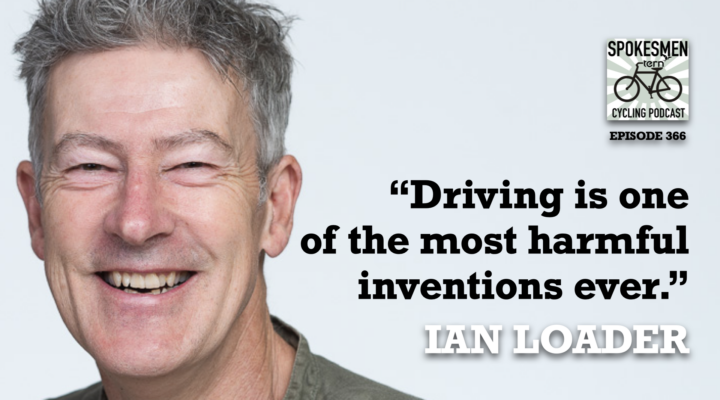
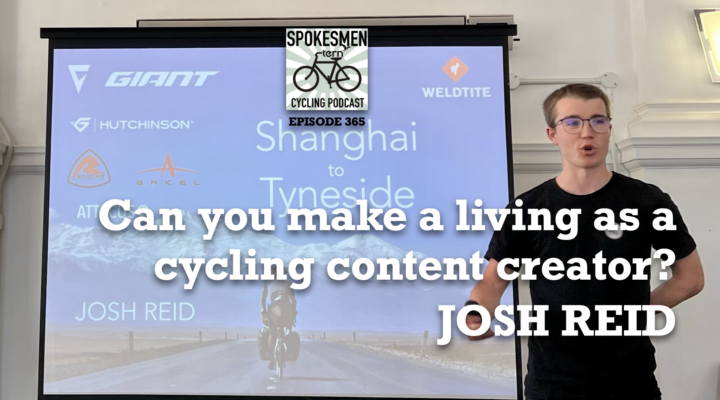
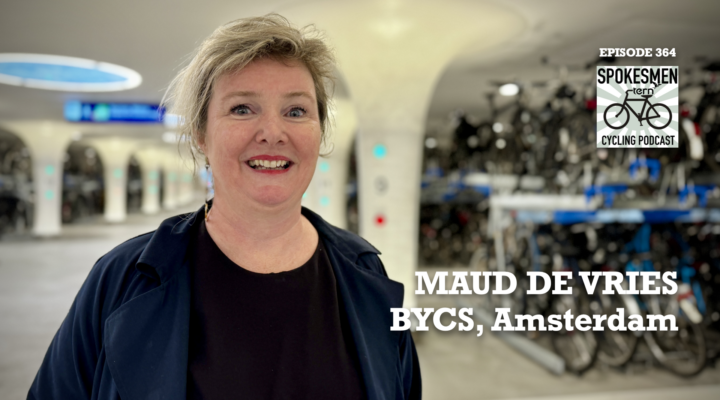
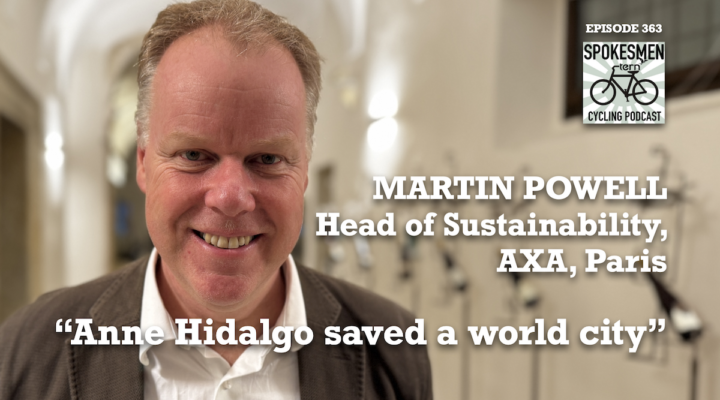
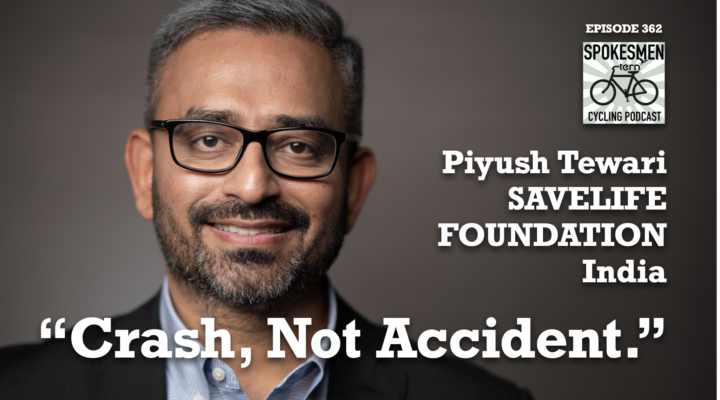
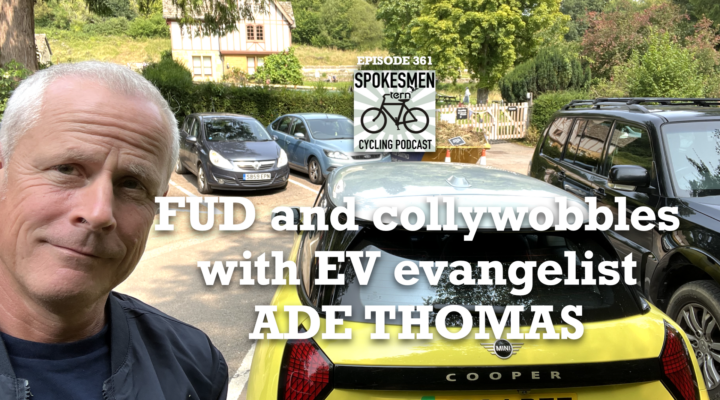
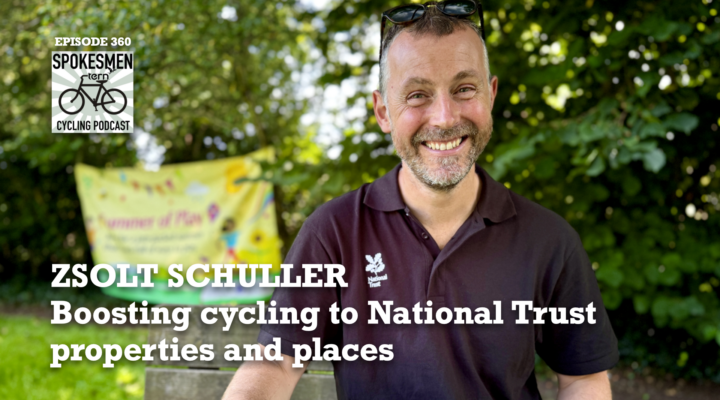
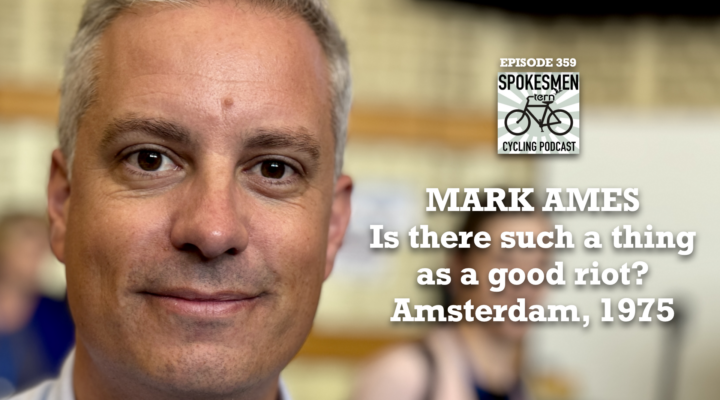
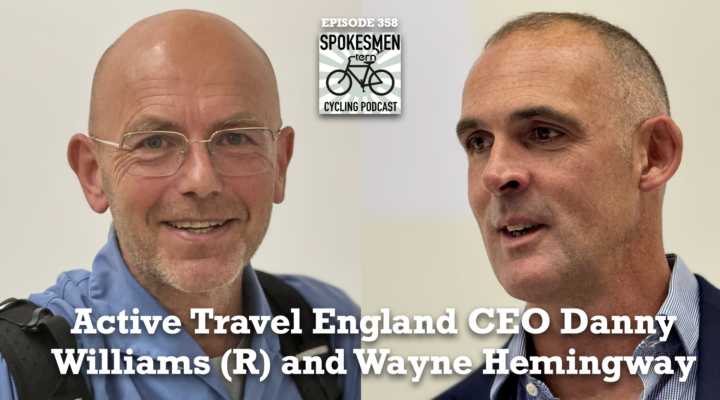
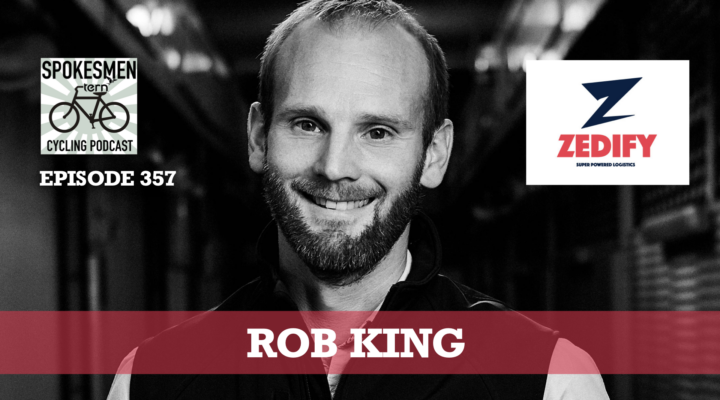
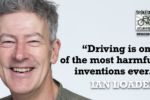
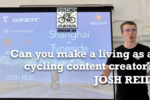

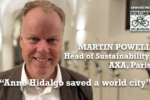
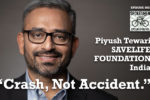


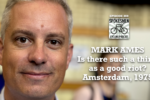
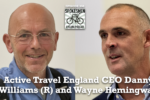
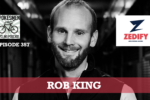
Be First to Comment